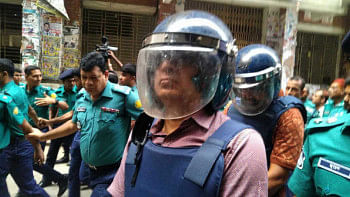Subhan led killings in 2 Pabna villages
Another prosecution witness yesterday linked Jamaat-e-Islami leader Abdus Subhan to a mass killing that left more than a dozen dead in two villages of Pabna during the Liberation War in 1971.
Freedom fighter Mohammad Shahidullah alias Shahid, son of martyr Sheikh Kobad Ali of Sadhupara under Pabna Sadar, said Razakar and Al-Badr men killed his father after Pakistan army had tortured him in presence of Subhan.
Apart from giving a vivid description of the massacre, Shahid, also 21st prosecution witness in the case against Subhan, described how his mother had earnestly requested the accused to release his father in vain.
“My father was a peace-loving man. He didn't commit any crimes. But he had to sacrifice his life because we, his two sons,
had joined the Liberation War … I want justice.” pleaded emotion-chocked Shahid before the International Crimes Tribunal-2.
On June 22, Momtaz Uddin Montu, a fellow fighter of Shahid, gave almost a similar testimony about the mass killing committed in Kolunia and Dogachi villages on May 11, 1971 and linked Subhan to the crimes.
Subhan, nayeb-e-ameer of Jamaat-e-Islami, faces nine charges, including genocide, committed in Pabna during the nine-month-long war. He had pleaded not guilty before the tribunal.
Shahid in his around two-hour testimony said he was involved in Chhatra League in 1971 and had heard that Peace Committee, an anti-liberation platform, was formed in Pabna in the first week of May with Subhan as its secretary.
Shahid, who also organised youths to join the war, was holding a meeting at a primary school at Kolunia in the morning of May 11 to discuss war preparations, the 64-year-old said.
The witness added that they had seen a white car, which was usually used by Subhan, going towards Dogachi from Pabna town around 10:00am and within 20 to 25 minutes, they had seen the car return. Within half an hour they, hiding inside a bamboo orchard, had seen several vehicles of the Pakistan army and the white car approaching the primary school, added Shahid.
“I saw the army led by Moulana Subhan going to the house of Samajuddin after they had got down from the vehicles. As they opened fire, Samajuddin was running towards a bush,” said Shahid.
“I saw Moulana Subhan giving a signal with his hand pointing at Samajuddin. As the army shot him, Samajuddin collapsed,” said Shahid. The army had destroyed eight to 10 houses including that of Samajuddin and continued shooting for around half an hour before leaving the area for neighbouring Dogachi village.
When they had come out from hiding, they found three more bodies there, he said.
The witness added that he along with others had gone to Dogachi after the army and the white car of Subhan had left the area around 2:30pm. They had found two bodies beside a burned temple in the village and two more bodies inside Dogachi Bazar. When they had visited the western part of the village, they found six to seven bodies inside a mosque, he added.
“Probably panicked people took shelter inside the mosque, but the Pakistan army gunned them down there,” said Shahid.
In the first week of September, the white car and an army pickup had stopped in front of their house, picked up his father and took him to Nurpur army camp, he said.
“My father endured severe torture there. In presence of Subhan Saheb, the Pakistan army told my father: 'we will release you once you bring back your sons, who are freedom fighters. We will recruit them in Razakar force',” said Shahid.
“My mother had met Subhan Saheb at his house and requested him to release my father. He told my mother: 'bring back your sons … your husband will be released',” he said.
His father was later handed over to the police and received bail when the police produced him before a court, said Shahid.
The Pakistan army had once again picked up his father and taken him to Nurpur camp eight to 10 days later and tortured him before handing him over to the police. He once again obtained bail due to poor health, said Shahid.
On October 13, members of Razakar and Al-Badr, auxiliary forces of the Pakistan army, killed his father when he was returning home after offering prayers at a nearby mosque, he said.
Shahid said he and his brother returned home after Pabna was liberated on December 19 and learned about the brutal incidents from his mother and relatives.
“Although Subhan Saheb was not in the area [after the Liberation War] his family members were in Pabna. We could have avenged my father's killing. But our conscience restrained us,” said Shahid.
“Whenever we see the red circle in our national flag we think it contains blood of my father,” said emotion-chocked Shahid, who identified Subhan in the dock.
Subhan's counsel Mizanul Islam had asked the witness three questions before the three-member tribunal, led by Justice Obaidul Hassan with members Justice Md Mozibur Rahman Miah and Justice Md Shahinur Islam, adjourned the proceedings until today.
Shahid is set to face further cross-examination today.

 For all latest news, follow The Daily Star's Google News channel.
For all latest news, follow The Daily Star's Google News channel. 



Comments